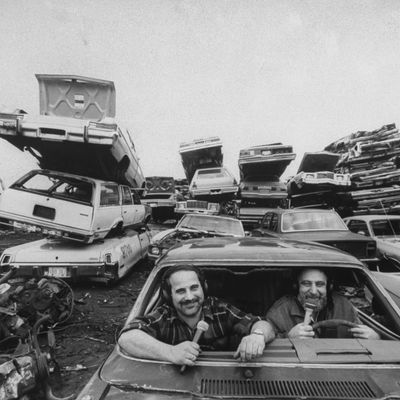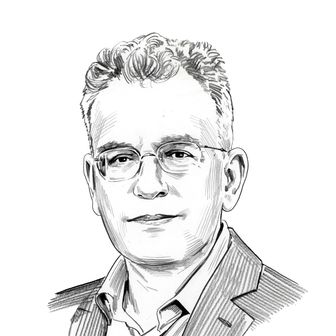
The NPR series ÔÇ£Car Talk,ÔÇØ as anyone who listens to it regularly will tell you, was a little about cars and a lot about talk. Two brothersÔÇÖ talk, in fact: Tom and Ray Magliozzi, the guys who hosted the show for 35 years, appeared to spend most of each episode trying to crack each other up while occasionally dispensing a few scraps of auto-repair advice from (as they described it) Car Talk Plaza. The brothers stopped producing new episodes in 2012, most likely because Tom ÔÇö who died of complications from AlzheimerÔÇÖs disease yesterday, at 77 ÔÇö was in decline. The reruns, though, ran steadily after that, and I wouldnÔÇÖt be surprised if they continue for awhile: The only thing that causes a ÔÇ£Car TalkÔÇØ episode to sound dated is the occasional jarring moment when a caller asks for help with, say, a 1982 Peugeot. The hosts were and are the draw, not the stuff about fuel injectors.
Radio is an intimate medium, despite its facelessness ÔÇö I suspect itÔÇÖs because the microphone is very close to the hostÔÇÖs mouth, and thus, the voice in your headphones sounds close, like someone murmuring in your ear. Yet there wasnÔÇÖt much murmuring on ÔÇ£Car Talk,ÔÇØ where a good 5 percent of the airtime was spent listening to Tom and RayÔÇÖs braying, rarely controlled cackling. They never would have made it on TV, where crispness and speed are the coin of the realm; in fact, in the 1990s, they tried a TV series, and it flopped. Even the car-obsessed Jay Leno, who had them on his Tonight Show, couldnÔÇÖt turn Tom and RayÔÇÖs shtick into good TV; they kinda bombed there, too. On radio, their shambling style fit just right.
None of it wouldÔÇÖve worked at all, however, without a key element: Tom and RayÔÇÖs knowledge. There is a pleasure in watching (or listening to) people do whatever it is theyÔÇÖre really good at. Julia Child, the Project Runway people, Norm Abram: We take comfort in their expertise, particularly when itÔÇÖs expertise we dramatically lack. At least someone knows how things are supposed to work. ItÔÇÖs the same jolt of pleasant surprise you get when you ask a friend about something related to her work, and abruptly see her step into professional drag and pull out a depth of knowledge youÔÇÖve never encountered before. You suddenly realize that she has an entire additional personality that her colleagues see but you rarely do. She has a small-scale, siloÔÇÖd superhero identity.
That, I think, was their secret. Tom and Ray presented themselves as two guys yukking it up, but here and there, youÔÇÖd see just enough brilliance peeking out around the edges that you knew something else was in their heads. Both were MIT graduates; both were engineers. They knew why a car works, not just how it works, and had the knack of explaining it, from first principles, with dopey-great analogies. TheyÔÇÖre the sort of guys whom youÔÇÖd like as your neighbors, particularly when a plumbing valve goes south on a Sunday. That ease with blue-collar aspects of life probably broadened their appeal: If you were a Republican, you could persuade yourself that they were in your camp. (Though I doubt they were, given that they grew up in Cambridge, Massachusetts, in the ÔÇÿ60s and spent their entire careers in public radio.) Either way, they played cluelessness well, conveying only a sneaking suspicion of smarts. ItÔÇÖs no wonder that they once got a jokey call from the Space Shuttle, asking why it had such a loud rattle at 17,500 miles per hour. As it turns out, the cars did matter, nearly as much as the talk.
A certain number of comedy folks actively disliked the show. Tom and Ray werenÔÇÖt ironists; their humor was apolitical, nerdy, broad, and blunt. They liked puns, and how-about-my-wife-ladies-and-gentlemen jokes. Comedic taste aside, it has also been argued that the sheer popularity of ÔÇ£Car TalkÔÇØ pushed more substantive programming off the NPR schedule, paving the way for a bunch of silly game-shows. ItÔÇÖs a legitimate knock, if a stuffy one, and it essentially blames Tom and Ray for making something people really liked. For what itÔÇÖs worth, the list of serious-minded radio people admired them is telling:┬áKurt Andersen, Susan Stamberg, and (with a few reservations) Ira Glass. ThereÔÇÖs no shame in public radioÔÇÖs having an entertainment arm, and Car Talk Plaza ÔÇö joined with Garrison KeillorÔÇÖs Fitzgerald Theater in St. Paul ÔÇö remains its headquarters.


